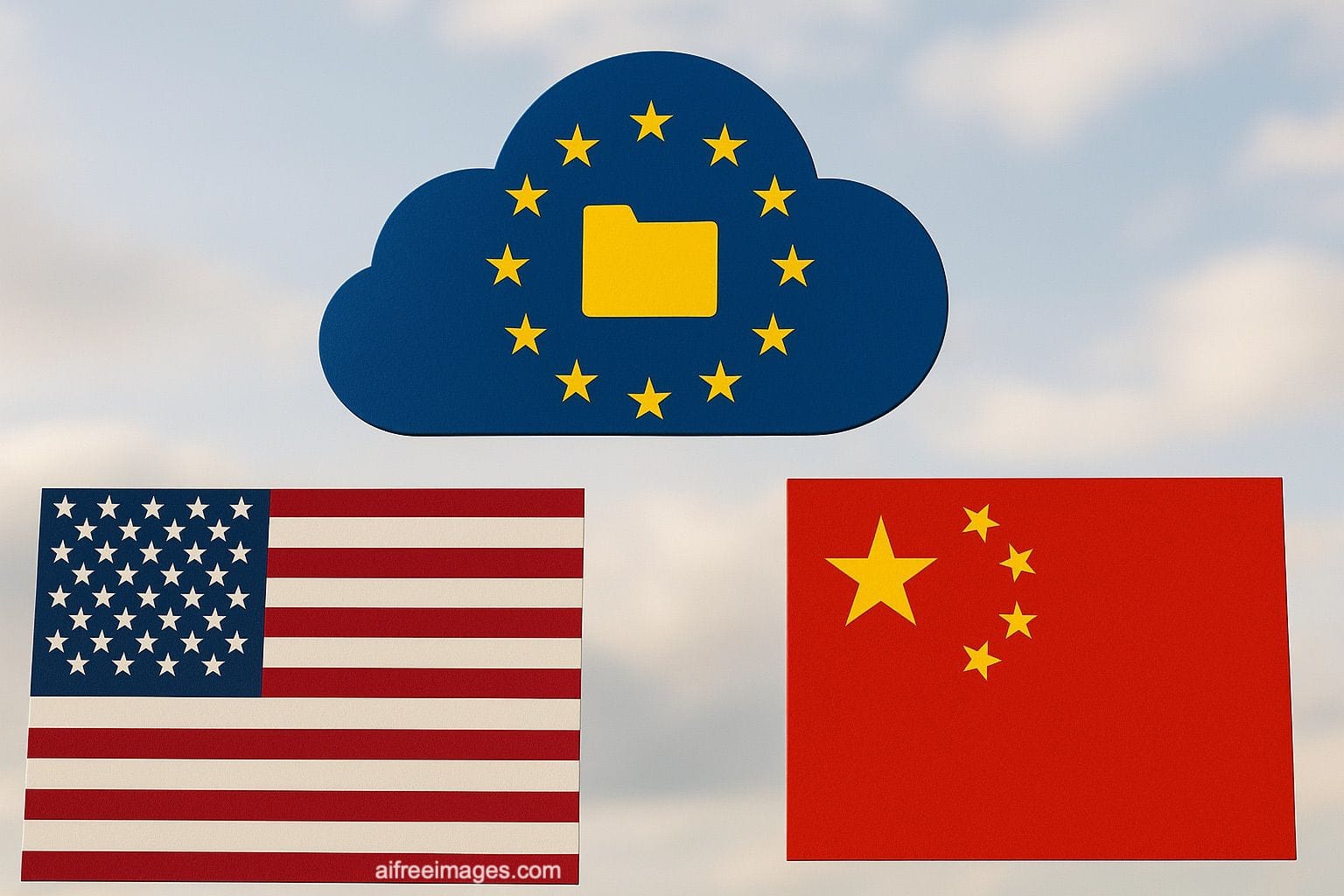The growing trade tension between the United States and China has transcended the economic sphere and has become a geopolitical battleground with significant technological implications. In this uncertain context, choosing a European cloud is not only a safer alternative but also an essential strategic decision to protect the operational continuity, data privacy, and digital autonomy of European companies and organizations.
The Cloud: New Epicenter of Global Conflicts
Digital infrastructure has become one of the most valuable assets of any company. Information no longer travels solely on paper or is stored in physical files: it runs over networks, is stored on servers, and is processed in real-time in the cloud.
In an interconnected world, major powers—and their legislations—compete for control of this information. Cloud services from American giants like Amazon, Microsoft, or Google, as well as their Chinese counterparts, represent not only technical solutions but also instruments of power and influence.
Therefore, when a European company hosts its data on infrastructures outside the EU, it exposes itself to the risk that a unilateral government decision—such as sanctions, embargoes, or blockades—could disrupt its operations without prior notice.
Key Advantages of European Sovereignty in the Cloud
1. Legal Protection Under the General Data Protection Regulation (GDPR)
One of the strongest reasons to choose a European cloud is the protection offered by the GDPR. This regulation guarantees the ethical, transparent, and secure processing of personal and corporate information. European providers cannot share data with third parties without the user’s explicit consent, which is not necessarily the case with platforms subject to non-EU regulations like the Cloud Act in the U.S.
Additionally, the GDPR requires the notification of any security breaches, the implementation of advanced security measures, and the provision of clear legal guarantees in the event of a conflict.
2. Independence from Geopolitical and Economic Tensions
The recent escalation of the trade war between the U.S. and China—with potential global implications—has demonstrated how digital infrastructure can get caught up in international disputes. Blocked services, access cuts, or technological restrictions are increasingly plausible scenarios.
A sovereign cloud located in Europe eliminates that risk: data remains on servers under European jurisdiction, shielded from external decisions.
3. Guarantee of Operational Continuity
The stability and continuity of service are crucial in a world where business activity increasingly depends on immediate access to documents, databases, collaborative platforms, or ERP systems.
A European provider, with data centers within the EU, cannot be affected by international sanctions or cross-border blockades, ensuring uninterrupted access to information even in times of global crisis.
What Do Cloud Storage Systems with European Sovereignty Offer?
Next-generation sovereign cloud solutions not only meet high security standards but also offer complete functionalities without the need for third-party tools. Notable features include:
- Real-time collaborative document editing (compatible with Office formats).
- Integrated video calls and chats.
- Advanced document management, with version control and permissions.
- Multi-device synchronization and access from anywhere.
- Encrypted automatic backups, protected by European legislation.
- Scalability without penalties for users or storage: you only pay for the resources used.
Local Support, Quick Integration, and Cultural Trust
One of the significant advantages of opting for a European provider is having proximity technical support, in your language, and knowledge of the local regulatory framework. This facilitates:
- A quicker and surprise-free implementation.
- Agile assistance in case of incidents.
- Continuous support to adapt the solution to the realities of the business.
Unlike large multinational corporations with English-speaking support and limited hours, local European support provides a closer, personalized, and more efficient experience.
Contractual Compliance and Guaranteed Storage in European Territory
Many European cloud providers include in their contract that data will be stored, processed, and protected exclusively within the European Economic Area (EEA). This provides an additional layer of legal guarantee by preventing the transfer of data outside the territory protected by the GDPR.
Additionally, it avoids the shared use of virtual disks, arbitrary traffic limits, or the usual technical restrictions in other cloud solutions. The performance and integrity of the system are maintained even during usage spikes or large volumes of information.
A Decision Aligned with the European Digital Strategy
The European Commission has repeatedly emphasized the need to achieve strategic digital autonomy to ensure the technological resilience of the continent. Initiatives like GAIA-X and the push for a federated European cloud reinforce the idea that the future of data storage and processing must involve solutions built, managed, and regulated in Europe.
Choosing a European cloud aligns with this vision, protects the digital assets of the company, and reinforces the trust of customers, partners, and public entities.
Conclusion: Security, Sovereignty, and Vision for the Future
In times marked by global instability, cyber threats, and tensions between powers, the location and control of data are more important than ever. Choosing a cloud with European sovereignty is not just a security measure: it is a gesture of digital independence and a commitment to business continuity.
For companies seeking freedom, regulatory compliance, close support, and control over their information, the answer is clear: a cloud designed in Europe, for Europe.
Reference: Escudo Digital

